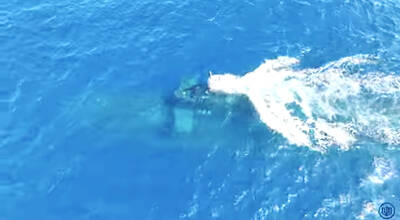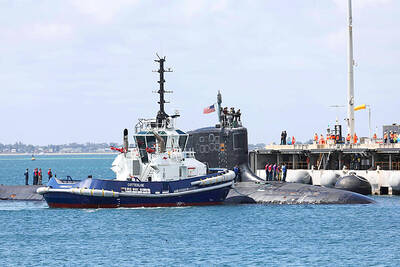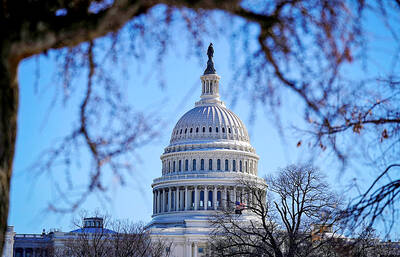In a speech on Saturday, Russian President Vladimir Putin blamed US policy for inciting other countries to seek nuclear weapons to defend themselves from an "almost uncontained use of military force" -- a stinging attack that underscored growing tensions between Washington and Moscow.
"Unilateral, illegitimate actions have not solved a single problem, they have become a hotbed of further conflicts," Putin said at a security forum attracting senior officials from around the world. "One state, the United States, has overstepped its national borders in every way."
In what his spokesman acknowledged was Putin's harshest criticism of the US, the Russian leader attacked US President George W. Bush's administration for stoking a new arms race by planning to deploy a missile defense system in eastern Europe and for backing a UN plan that would grant virtual independence to Serbia's breakaway province of Kosovo.
The Bush administration said it was surprised and disappointed by Putin's remarks.
"His accusations are wrong," said Gordon Johndroe, Bush's national security spokesman.
"We are surprised and disappointed with President Putin's comments," Johndroe added. "We expect to continue cooperation with Russia in areas important to the international community such as counterterrorism and reducing the spread and threat of weapons of mass destruction."
US presidential hopeful Senator John McCain, who was also attending the conference, described Putin's remarks as "the most aggressive speech from a Russian leader since the end of the Cold War."
The US and an increasingly assertive Russia have repeatedly butted heads during the past year, with US Vice President Dick Cheney accusing Moscow of using its energy resources as "tools of intimidation or blackmail."
Washington has also been angered by Russia's reluctance to impose meaningful sanctions against Iran, which is accused of seeking to develop nuclear weapons under the cover of a civilian atomic energy program.
But Putin said it was "the almost uncontained hyper use of force in international relations" that was forcing countries opposed to Washington to seek to build up nuclear arsenals.
"It is a world of one master, one sovereign ... it has nothing to do with democracy," he said. "This is nourishing the wish of countries to get nuclear weapons."
"This is very dangerous, nobody feels secure anymore because nobody can hide behind international law," Putin told the gathering.
Putin did not mention the wars in Iraq or Afghanistan. But he voiced concern about NATO's expansion plans as possible challenges to Russia.
"The process of NATO expansion has nothing to do with modernization of the alliance or with ensuring security in Europe," Putin said.
"On the contrary, it is a serious factor provoking reduction of mutual trust," he said.
On the missile defense system, Putin said: "I don't want to accuse anyone of being aggressive" but suggested it would seriously change the balance of power and could provoke an unspecified "asymmetric" response.
also see story:
Albanians protest UN Kosovo plan

CSBC Corp, Taiwan (台灣國際造船) yesterday released the first video documenting the submerged sea trials of Taiwan’s indigenous defense submarine prototype, the Hai Kun (海鯤), or Narwhal, showing underwater navigation and the launch of countermeasures. The footage shows the vessel’s first dive, steering and control system tests, and the raising and lowering of the periscope and antenna masts. It offered a rare look at the progress in the submarine’s sea acceptance tests. The Hai Kun carried out its first shallow-water diving trial late last month and has since completed four submerged tests, CSBC said. The newly released video compiles images recorded from Jan. 29 to

DETERRENCE EFFORTS: Washington and partners hope demonstrations of force would convince Beijing that military action against Taiwan would carry high costs The US is considering using HMAS Stirling in Western Australia as a forward base to strengthen its naval posture in a potential conflict with China, particularly over Taiwan, the Wall Street Journal reported on Saturday. As part of its Indo-Pacific strategy, Washington plans to deploy up to four nuclear-powered submarines at Stirling starting in 2027, providing a base near potential hot spots such as Taiwan and the South China Sea. The move also aims to enhance military integration with Pacific allies under the Australia-UK-US trilateral security partnership, the report said. Currently, US submarines operate from Guam, but the island could

RESTRAINTS: Should China’s actions pose any threat to Taiwan’s security, economic or social systems, China would be excluded from major financial institutions, the bill says The US House of Representatives on Monday passed the PROTECT Taiwan Act, which states that Washington would exclude China from participating in major global financial organizations if its actions directly threaten Taiwan’s security. The bill, proposed by Republican Representative Frank Lucas, passed with 395 votes in favor and two against. It stipulates that if China’s actions pose any threat to Taiwan’s security, economic or social systems, the US would, “to the maximum extent practicable,” exclude Beijing from international financial institutions, including the G20, the Bank for International Settlements and the Financial Stability Board. The bill makes it clear that China must be prepared

Taiwanese trade negotiators told Washington that Taipei would not relocate 40 percent of its semiconductor production to the US, and that its most advanced technologies would remain in the nation, Vice Premier Cheng Li-chiun (鄭麗君) said on Sunday. “I told the US side very clearly — that’s impossible,” Cheng, who led the negotiation team, said in an interview that aired on Sunday night on Chinese Television System. Cheng was referring to remarks last month by US Secretary of Commerce Howard Lutnick, in which he said his goal was to bring 40 percent of Taiwan’s chip supply chain to the US Taiwan’s almost